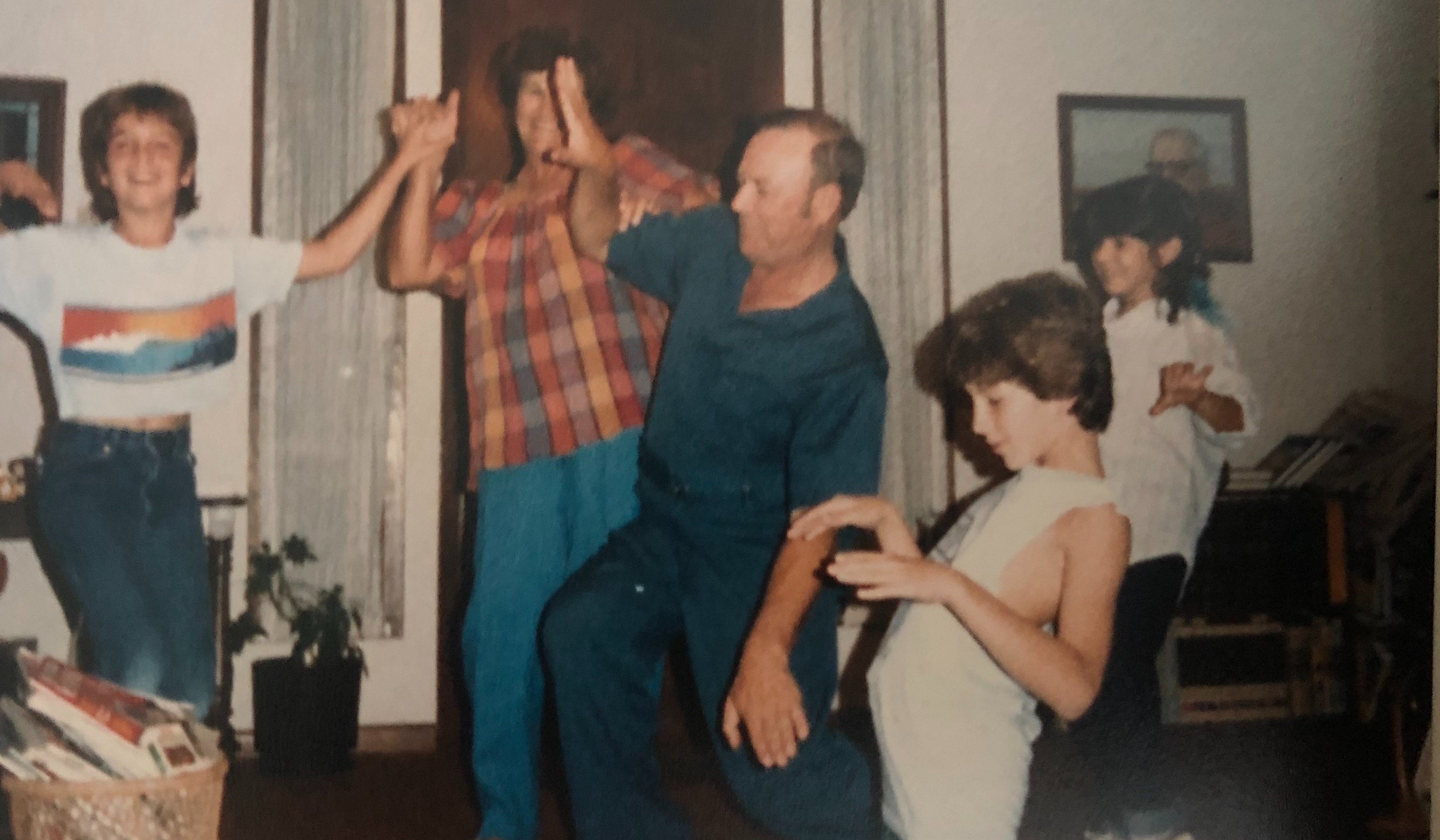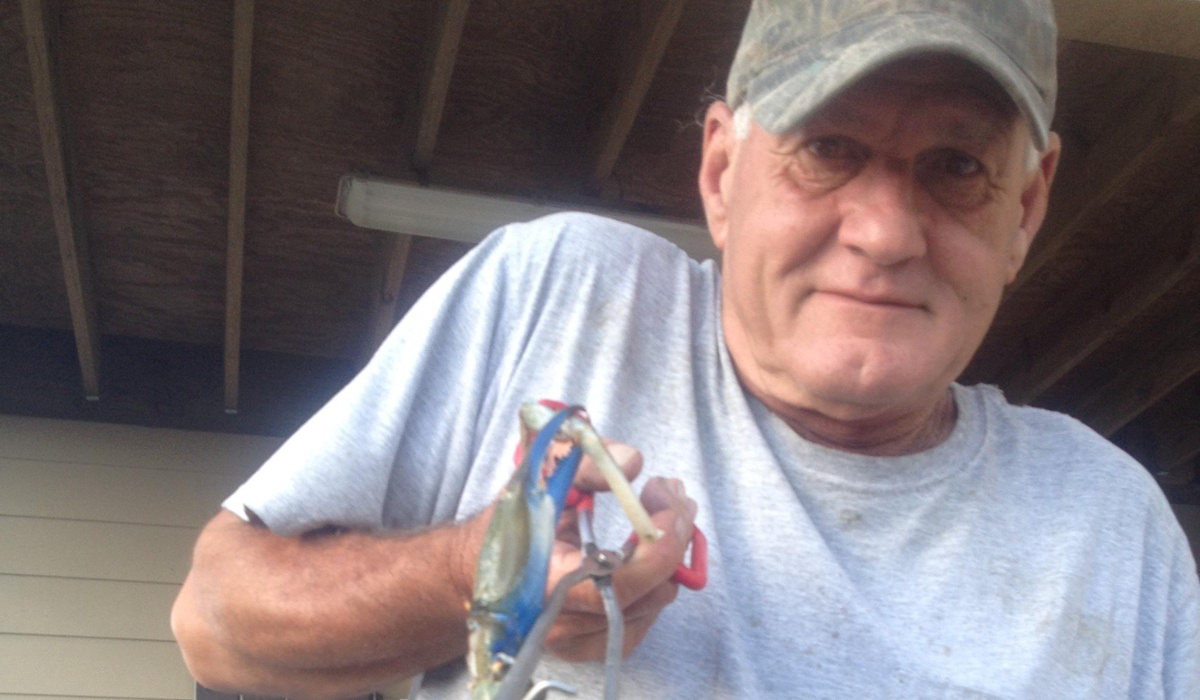How do I Grow Positive Feelings?
Can cultivating a daily habit of growing positive feelings begin with noticing gratitude or victories within ourselves and those around us?...
5 min read
KD Holmes, LPC
:
Dec 2, 2023 4:15:54 PM

One of my most cherished memories of my grandfather, Pappa Joe, is the time we all gathered and had a blast breakdancing. Of course my grandmother joined in on the fun! As a child, my grandfather was a patient man who love to play, with a laughter so infectious it could fill the room.
During my younger years, much earlier than the time of this particular memory, I spent countless hours sitting on my grandfather's shoulders, joyfully playing with his hair, drawing inspiration from my Monchhichi dolls. He would let me experiment with different hairstyles, indulging my whims for what felt like an eternity. His laughter would fill the air as I proudly created all sorts of ponytails on his head, playfully teasing me, with my grandmother cheerfully joining in on the fun once again.
No other family members would indulge my imaginative hairstyling adventures as a 5-year-old. Once my mission was complete, I would proudly give him the honorary title of "Monchhichi," reveling in my small accomplishment.
As I grew older, these memories transformed into stories my Pappa Joe loved to reminisce about. Our bond during my childhood was unbreakable, but the challenges of aging and my teenage years strained our relationship. Both of us became firm in our opinions, even if they differed.
Only with time did I come to realize that our respective experiences with "aging" were actually rooted in untreated depression. As my granddad aged, he battled with growing feelings of loneliness and misery, which often came out as anger and irritability. Similarly, as I journeyed through my teenage years, I too was depressed and encountered my fair share of anger and irritability.
So let's go back in time, about 10 years ago. My heart aches as I recall the moment my grandmother suffered an agonizing crack in her vertebrae, for the second time, while tirelessly cleaning her home. She was such a resilient spirit, full of laughter, and a true workhorse whom I deeply cherished. During that challenging period, I made it a point to check on them frequently. As the days passed, I couldn't help but notice the weight of sadness engulfing my grandfather, like a dark cloud hanging over him.
Amidst the chaos, my grandfather was consumed by the belief that my grandmother's life was nearing its end, and he would be forced to bear witness to her suffering until the very end. Ironically, she defied his expectations and lived for another five years after his passing. This serves as a testament to the profound impact of traumatic events on our perception of outcomes, often causing us to view them as catastrophic.
As the story unfolded, my grandmother found herself confined to a nursing home, her mind clouded by excessive medication. It was devastating to witness her decline in functioning, especially considering that she had been my grandfather's beloved wife for over three decades. He spent countless hours alone at home, and when he visited my grandmother, the heartbreak in his eyes was palpable.
I want to illustrate the overwhelming devastation he felt by painting a picture of the situation. In his mind, he was unable to look beyond the walls of the nursing home, even though my family and I knew it was only a temporary situation. We knew that she would successfully recover and return home. Unfortunately, he couldn't believe the doctors or us.
One fateful morning, he made the heart-wrenching decision to end his own life. He left us a heartfelt note and quietly slipped outside. It was his final act of kindness, making sure not to disturb the home he had shared with my grandmother. The weight of sorrow still overwhelms me, knowing that he chose to depart from this world in such a violent manner.
It was a shocking and devastating act, especially considering his deep religious beliefs. This tragic event serves as a clear indication of the severe mental illness he was battling. It further reinforces the notion that symptoms of depression can be exacerbated by traumatic experiences.
I was devastated, traumatized. I felt responsible and like I had not done enough, like knowing someone’s suffering made me complicit in their choices. Only loved ones of suicide know the gut-wrenching pain that accompanies it. The guilt, no matter how irrational, becomes embedded within us-- along with the horror of their action.
Some family members were consumed by anger, others left in utter shock, while some simply drowned in a sea of sorrow. These visceral reactions are all understandable responses to the wreckage that suicide brings.
So what did I do with my feelings? I delved deep into the realm of studying suicidal ideation. It is a profoundly human reaction to relentless anguish—a response that arises from helplessness. Humans are fueled by an innate desire to solve problems, we will resort to desperate measures to "solve" a problem. These solutions seem illogical to outsiders but make sense within the sufferer. This is why professional help is essential. Sufferers cannot control their thoughts, but can strive to navigate them with professional guidance.
Seek the support of a trained therapist—who can help guide you through the labyrinth of despair.
With this issue, we can never truly know someone's true intentions.
Additionally, if you have lost a loved one to suicide, I encourage you to seek counseling. The pain, guilt, and trauma associated with such an event can be overwhelming, but there is help available to guide you through the process.
Therapy provides a safe haven where you can delve deep into your emotions, confront feelings of guilt, and navigate the grieving process. It offers a supportive environment that allows your body to process grief in a way that is impossible when you are alone. Through therapy, you can unravel the complexities of your emotions, untangle the knots of sorrow, and find solace in sharing your burdens with a trained professional. The therapeutic journey empowers you to confront your inner struggles, and confront your deep pain. It is a transformative process that guides you towards self-compassion, you are not alone in your journey; you have a compassionate guide to help you navigate the winding paths of grief and emerge more resilient on the other side.
The brain houses memories deep within its recesses to shield you from potential harm, and protect you from future harm, intensifying the emotions of grief, especially in the aftermath of a traumatic event like suicide. Trauma therapy offers a more efficient path to navigate through the trauma, allowing you to grieve without the added intensity of the traumatic part of this distressing experience.
I can personally attest to Eye Movement Desensitization and Reprocessing (EMDR) therapy and Deep Brain Reorienting. Through this therapeutic approach, I was able to KNOW that I had done everything within my capacity and that the blame did not rest with me. It also provided me with the tools to navigate the profound grief that comes with losing someone in this unimaginable way. Prior to therapy, my focus was solely on his violent death, but now I can reminisce about the cherished moments of our childhood, where I was perched upon his shoulders, playfully calling him my "monchee-chee." These precious memories have returned and fill me with love and laughter.
In times of immense loss and heartache, finding solace and support in others who have walked a similar path can be incredibly healing. Grief and suicide support groups offer a safe space for individuals to share their stories, express their emotions, and connect with others who understand the depth of their pain. These groups provide a sense of community, empathy, and understanding that can help in the healing process.
Support from others who have experienced similar losses can be a powerful source of comfort and validation. Being able to openly discuss feelings of guilt, anger, confusion, and sadness with individuals who truly comprehend the complexities of grief can be incredibly therapeutic. These support groups offer a non-judgmental environment where individuals can lean on each other, offer guidance, and find strength in unity.
Attending grief and suicide support groups can also provide valuable coping strategies, tools for managing emotions, and resources for navigating the difficult journey of healing. Whether it's through group discussions, therapeutic activities, or simply being surrounded by individuals who share a common bond, these support groups offer a lifeline for those grappling with the profound impact of losing a loved one to suicide.
The mind can be a labyrinth of twists and turns, with hidden pitfalls and dark corners. Sometimes, life events can throw us into a deep hole where we feel trapped and unable to escape. However, through therapy and the power of trauma work, we can find the strength to climb out of that hole and navigate our way back to ourselves. It's like turning a corner and rediscovering the essence of who we truly are.

Can cultivating a daily habit of growing positive feelings begin with noticing gratitude or victories within ourselves and those around us?...

I am told by my clients I am gentle, approachable, easy to talk to, and silly. However, working in a room with just one other person can make it...

The sorrow over my father's death lingers, an ache swirling in my heart, triggered by reminders. Today is one of those days, the anniversary of his...